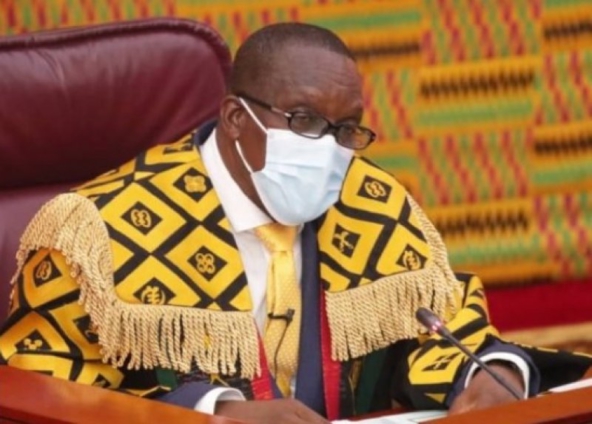The Speaker of Parliament, Mr Alban Sumana Bagbin has asked member of the House to be guided by their conscience and integrity in their exercise of the power over the public purse.
He reiterated that it required fair knowledge about financial issues, and urged the legislators to learn from capacity building programmes and use the knowledge to make meaningful and effective contributions in their deliberative functions on financial issues.
Speaker Bagbin made the call when he opened a two-day 2021 post-budget workshop for Members of Parliament in Ho, the Volta Regional Capital to equip the legislators with knowledge to make effective contributions in the debate on the 2021 budget and economic policy of the Government of Ghana, presented to the nation, through Parliament by caretaker Finance Minister, Osei-Kyei-Mensah Bonsu last Friday.
“I would urge members to engage in thought-provoking deliberations and take home lessons from the workshop that can enrich debate and discussions of the budget at plenary.”
“… Honourable members, at the end of the day after all have been said and done, it is left to your conscience and integrity to do what is right and in the interest of the country and our people,” the Speaker said.
The workshop on the budget theme: “Economic Revitalization through Completion, Consolidation and Continuity.”
Topics to be discussed include; policy underpinnings of the 2021 budget-General Analysis, Overview of the 2021 budget-Macro Economic and Fiscal Management and what to consider in analyzing the 2021 Sector Budget.
Other topics are Employment Generation and Public Sector Wages – the 2021 budget, Decentralisation of the 2021 budget and Composite Budgeting, the Health Sector, Covid-19 and post-Covid19 Management – the 2021 budget, the Agricultural Sector and the 2021 budget, Revenue Mobilisation, and Education and the 2021 budget.
Mr Bagbin noted that decision making by Parliament in respect to budget approval should be evidence-informed with readily available accurate data and information that members and the House can rely on in its deliberations.
He however observed that access to such data and information will enable the House to take informed decision on the budget is limited.
Also the time available for the House to debate such matters was short, in addition to constraints posed by constitutional, legal and institutional weaknesses.
“International best practice recommends that a minimum of three to four months is required for the approval of a budget by the legislature, if that approval is to base on meaningful analysis and scrutiny, “the Speaker said, adding that the budget should be tabled sufficiently in advance of the fiscal year to which it relates, to enable the legislature to make decision on the matter.
The Speaker reminded the legislators that the scrutiny of the budget should make Ghana stronger and better positioned to face the challenges that confront the nation and its people.
Speaker Bagbin reminded the House that the scrutiny of the budget also reflected the moral values that each member had.
“So honourable members do not think that we are here only to understand and give direction on members: the debate on the budget will also signal the values that MPs stand for, what we cherish and the direction we want Ghana to pursue.
The Speaker said the activity of debating and approving of the budget and financial policy proposals to the President, was crucial to the health, well-being and quality of life of the country and its people.
To that end, Parliament had to also employ and put into use all its functions, skills and tools of deliberation, representation, law-making, financial scrutiny, and priority setting.
The Speaker put the blame of the lack of, or misuse of and misapplication of public funds equally at the doorstep of both the President and Parliament, stressing the need that the House would ensure discipline in the management of the public purse.
“It is therefore unfortunate for members to sometimes be seeing to rather act as gag dogs of the President, and not watchdogs of the people during budget debate on the floor of Parliament and on the airwaves.
“To this respect one needs not emphasis the importance of post-budget workshop to Parliament and parliamentarians,” Mr Bagbin said, adding “It is my expectation that this will equip you with the necessary understanding and tools to adequately discharge your responsibilities of ascertaining the extent to which the budget addresses the numerous problems of constituents, and reflect the collective interest needs and aspirations of the citizenry as a whole before voting to approve it.
Latest Stories
-
Global fashion waste crisis: Africa calls for an end to ‘waste colonialism’
1 hour -
Daily Insight for CEOs: Mastering business agility – A CEO’s competitive advantage
1 hour -
US deports more alleged gang members to El Salvador
2 hours -
Zimbabwe shuts down amid calls for protests
2 hours -
At least 5 killed in explosion at Spanish mine
2 hours -
Six houses belonging to herdsmen torched in Gomoa Amenfi over farm dispute
4 hours -
Int’l. Islamic Youth League, African Youth Devt. Centre supports Muslim community during salah celebrations
5 hours -
Kumasi fire: A/R Minister halts creation of new lorry terminal after fire
5 hours -
Vanuatu Trade Commissioner to Ghana Amb. Prof Hugh Keku Aryee wins ‘Best in AI Innovation’ award
5 hours -
Anlo-Afiadenyigba Youth Council congratulates Wisdom Seade on Keta MCE nomination
5 hours -
Gov’t undertakes initiative to prevent conflicts in Volta Region – James Gunu
5 hours -
Suhum Children’s Hospital in distress; ‘Love Without Walls’ to the rescue
5 hours -
The death of a legend of legends – Teddy Osei of Osibisa
5 hours -
Ja Rule tours National Museum ahead of Nuaso school commissioning
5 hours -
Agotime-Kpetoe market women protest NDC’s failure to appoint female DCE
5 hours

